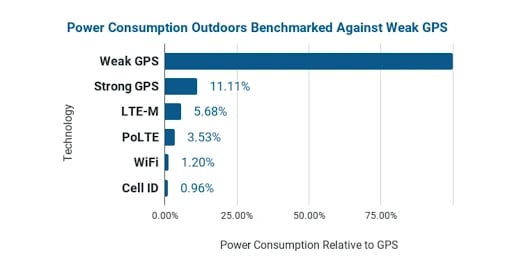Global Positioning System (GPS) solutions are the most well-known navigation technology. Although GPS provides highly-accurate results for location detention, the trade-off is short battery life when in use by the designated device. Many companies try to use GPS for tracking inventory and equipment, but this leads to difficulties. That said, there might be a way to extend the battery life on tags that use GPS technology.
How Does GPS Tracking Work?
One of the biggest uses GPS technology is through a smartphone. The most common use case is navigation. The basic GPS service provides users with approximately 7.0-meter accuracy, 95% of the time, anywhere on or near the surface of the earth. This type of navigation comes from a global network of 31 satellites that transmit radio signals from medium-earth orbit. Each satellite emits signals that enable receivers to communicate with the devices. A minimum of four satellites are necessary to determine location.
Why GPS Is Draining On Its Own
Communication between devices and satellites requires a significant amount of power. In comparison to other technologies, GPS consumption rates are more than double. As shown in the graph below, consumption rates increase if there is a weak connection in the area.

One thing that can cause a weak signal is using a device inside of a building. For an asset tracking system to provide locations indoors and outdoors, other technology like Bluetooth Low Energy (LE) needs to be incorporated to make up for that weak signal.
BEST USE CASE FOR GPS
Since GPS-only solutions are expensive and come with restrictions, valuable use cases are difficult to find. The best option is tracking heavy equipment like trucks or tractors that spend the majority of their time outdoors or on the road. Even then, it can get expensive. If any heavy equipment needs to be stored indoors, the GPS tags would have to be plugged into an outlet or paired with other technologies to maintain visibility.
Join the AirFinder Difference!
- Innovation. Organizations can be freed up to innovate and bring more impactful products and services to market.
- Profitability. Increased profitability provides new opportunities to innovate and improve valuation.
- Digital Transformation. Discover competitive advantages, new revenue opportunities, improved customer relationships and increased efficiency.
How to Use GPS without Draining Battery Life
Link Labs has created SuperTag, an asset tag that extends battery life by combining GPS with other technologies. These other technologies include WiFi, Cellular, and the AirFinder OnSite network. The SuperTag is designed to work both indoors and outdoors. These other technologies offer locations at a fraction of the power consumed by GPS only-solutions. Because the SuperTag uses more than one technology, the battery life is slowly sipped instead of gulped.
Another SuperTag feature that saves battery life is flexibility or customization. The amount of times a tag updates its location has a profound impact on battery life. With SuperTag, you can set updates anywhere from once a day to every 5 minutes. Not only does the user choose how often tag updates, but also the order of technology usage. In other words, when GPS has a poor signal, you can choose WiFi or Cellular to be the backup. GPS doesn’t even have to be your first technology choice!
Does This Sound Like the Solution for Your Company?
Using GPS for tracking your equipment and inventory is draining to battery life, but it’s possible to maintain the accuracy you get without hurting battery life. Link Lab’s SuperTag has created a balance between accuracy and battery life. To learn about more SuperTag capabilities, book a demo with us!




